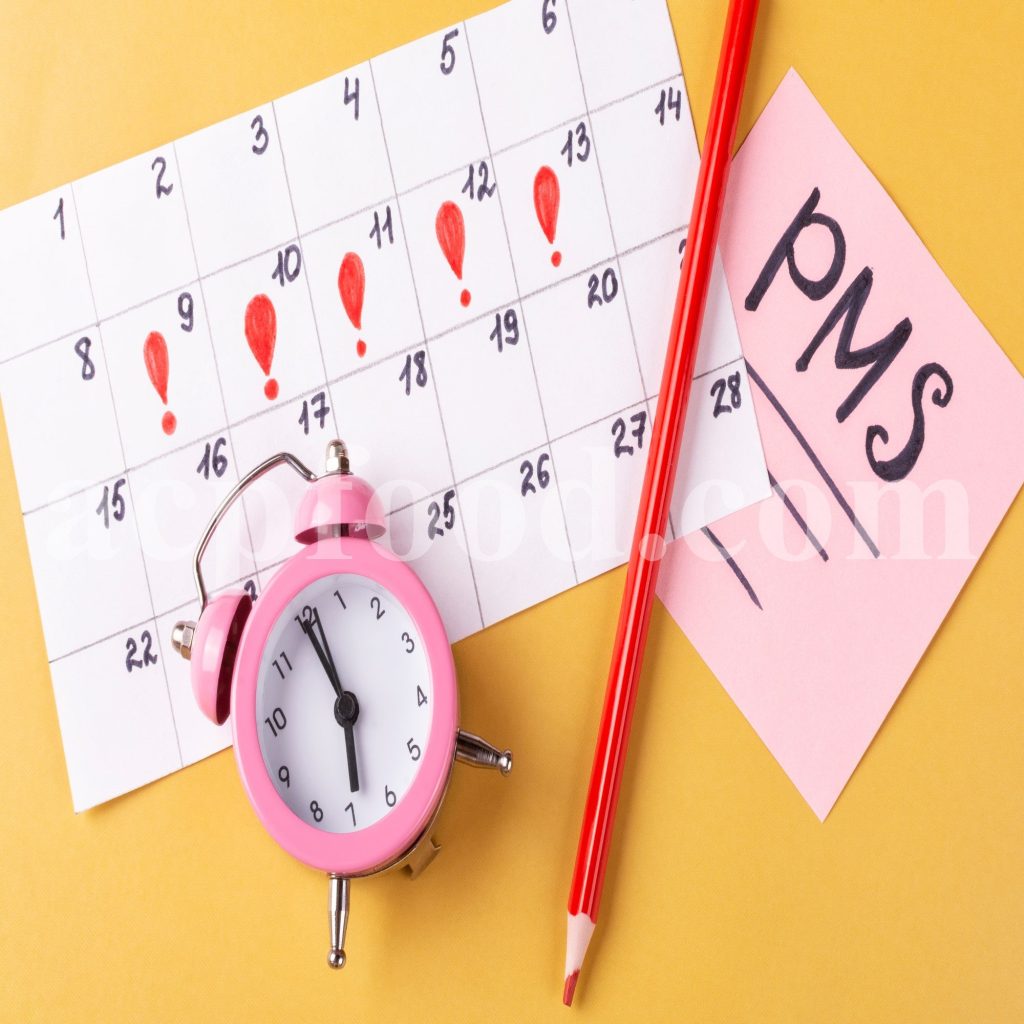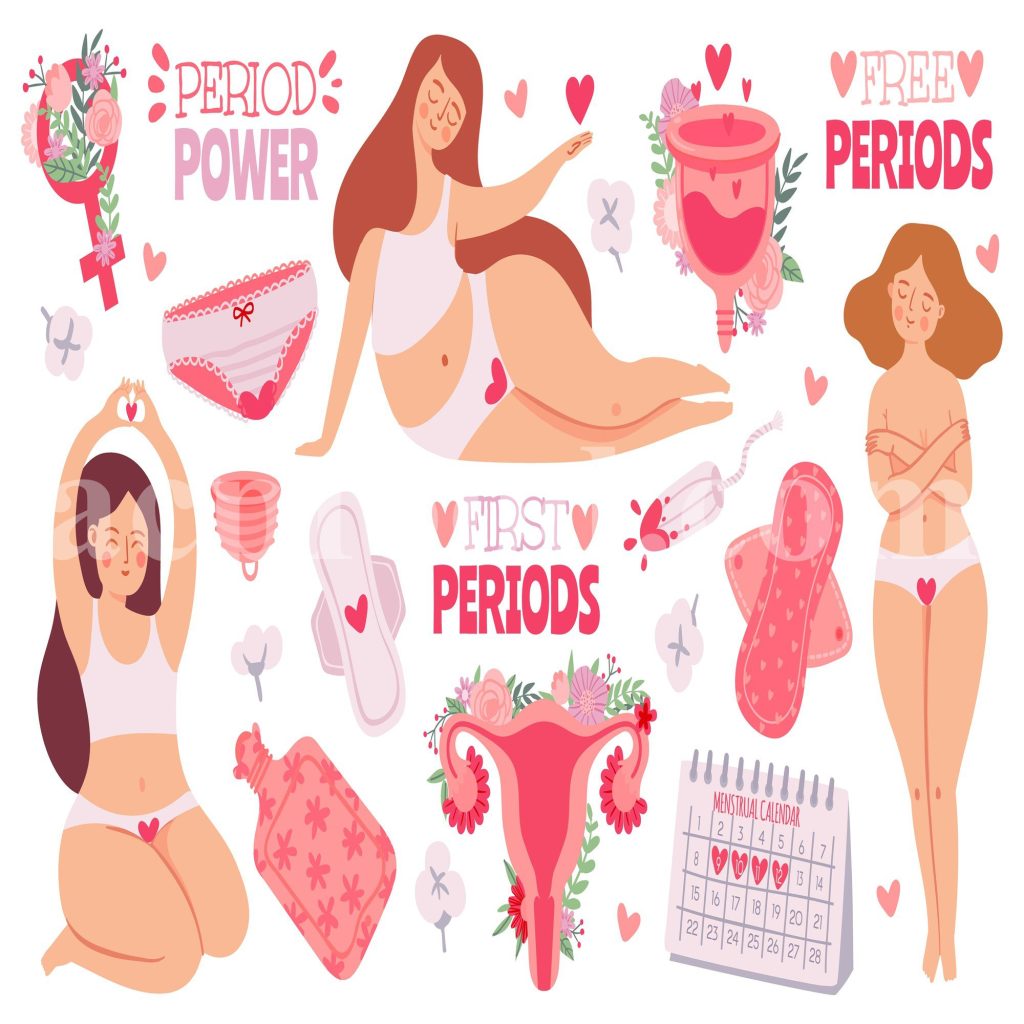Menstruation is one of the signs of puberty in girls. The age at which girls reach the stage of physical maturity is different and depends on various factors such as: environmental factors, hereditary factors, race, weather and nutrition are involved in this issue.
In general, girls mature earlier than usual in tropical areas.
Table of Contents
ToggleMenstruation
In girls, from the age of 8, when the hypothalamus gland in the brain activates the ovaries, the amount of estrogen hormone starts to increase. The production of estrogen and other hormones increases from the ovaries until the age of 11 to 12 years, which is enough for the breasts to enlarge and menstruation to begin.
Research shows that before ovulation, women answer the IQ test fast but incorrectly, and they get distracted faster and can’t concentrate well, but in a week after menstruation, they answer the same test slowly but more correctly. Mental and emotional changes caused by hormones are not limited to the fluctuations of the menstrual cycle.
After child birth, progesterone and other sex hormones drop sharply, and at that time, women are more vulnerable to various mental illnesses, which depression is one of them.
The Cause of Menstruation
In different periods of a woman’s life, the ovaries are responsible for several tasks, the most significant of which are ovulation or the production of special cells for reproduction and the secretion of reproductive hormones, including: estrogen and progesterone.
In young girls, the reproductive system grows under the influence of reproductive hormones, and the symptoms of puberty, including menstruation, appear in them.
Ovulation in a woman occurs after the end of a monthly menstrual period in such a way that one of the small bubbles that exist on the surface of the ovaries starts to grow quickly and becomes large and swollen, which is called a follicle. Inside each follicle is an ovule or reproductive cell.

On the 14th day from the first day of menstruation, this bubble bursts on the surface of the ovary due to the pressure of the follicular fluid and the ovule in it is released. Then this ovule enters the uterine tube as a result of the movements of the fallopian tube.
The ovule, which can be seen with a magnifying glass or a microscope, remains inside the fallopian tube and if it does not meet the male reproductive cell (sperm), it is destroyed after 24 hours.
But if sexual intercourse is done shortly before ovulation or at the same time, millions of spermatozoa or male reproductive cells, which are poured into the female genital tract, are active with rapid movements.
Spermatozoids or male reproductive cells that can be seen through a microscope are small and active cells, each of which is almost in the shape of a baby frog. Each of these cells has a relatively large head and a narrow tail, they can move up towards the vagina and reach inside the uterus, near the female ovary with fast movements, but despite this, only a limited number of spermatozoids can pass through the external uterine orifice and reach the uterus because a large number of them stop moving and are destroyed in the female genital tract or vagina.
Spermatozoids that have reached the uterus enter the uterine tube and from there they attack the female ovule. Therefore, a large number of spermatozoa gather around the ovule or female reproductive cell and surround it soon.
The activity of spermatozoa continues to enter the ovule, but only one of them succeeds to enter the ovule and fertilize it.
In this way, when the first sperm enters the ovule, a strong membrane is stretched around it, which prevents other sperm from entering.
From the combination of the female reproductive cell and the male reproductive cell, an “germ cell” is formed, which gradually produces an embryo and then a human being, and therefore, as described, pregnancy begins and menstruation stops until the time of delivery.
Why Does Menstruation Occur in Women?
In female gender, periods start from the time of puberty and its stages continue to repeat alternately and almost regularly for several years. A sexual cycle in women usually consists of 28 days, which includes 3 to 5 and sometimes 7 days of bleeding from the reproductive system.
Conventionally, the first day of bleeding from the genital tract in menstruation is considered as the first day of a sexual period.
In short, women naturally experience uterine bleeding once every 28 days for 3 to 5 and sometimes 7 days, which is called menstruation.
During menstruation, the cells of the mucous tissue are separated from the inner surface of the uterus and fall, which causes bleeding and menstrual secretions.
In women, after menstruation in a sexual period, from the 7th to the 14th day, the cells of the uterine mucosa and its glandular cells begin to multiply and renew and repair the tissue shed in the uterus. In addition, from the 15th to the 28th day, the mucous glands of the uterus swell and ooze mucus.
At this stage, the underlying tissue or lining of the uterus becomes thick and full of blood and also if the fertilized germ cell is implanted in the uterus and the so-called pregnancy occurs, the cells of the uterine lining remain stable, but otherwise, menstruation occurs and the surface part of the lining of the uterus along with blood secretions is separated from the uterus and come out from the body.
Unlike the blood of other parts of the body, menstrual blood does not clot, but sometimes very small clots may be seen in it. But if the menstrual bleeding is very heavy, usually large clots are formed.
Over the years, a woman approaches menopause. At the age of 30 to 40 years, the amount of estrogen hormone in women starts to decrease.
In the early 40s, women enter menopause. In this stage, the regularity of monthly period decreases and the skin becomes drier and the hair becomes more brittle and thinner. After this stage, on average, at the age of 50 or 51, the menopause stage comes and menstruation stops forever.

Premenstrual Syndromes (PMS)
Premenstrual symptoms have attracted the attention of researchers and medical practitioners all over the world. Despite many books, many clinics, and many medications, there are currently no definitive medical, hormonal, or psychological tests available to diagnose premenstrual symptoms in USA, Europe, and other countries. Its diagnosis is a personal matter that is mostly done by the woman herself.
In this case, more than 50 types of symptoms can be mentioned, some of which are: depression, impatience, mood swings, stubbornness, confusion, fatigue, food cravings, headaches, weakness, weight gain, body swelling, constipation, acne, joint pain, and painful breasts.
Menstrual DisordersIrregular menstruation refers to menstrual periods that have a large difference in their start time and are not regular. This type of disorder and irregularity in menstruation is very common in two stages of life: one is in young girls and those whose menstruation has just started, and the other is in middle age and in women who are on the verge of menopause and soon their menstruation will be stopped forever. Menstrual periods are on average 28 days, but in some women, these periods occur every 24 days, and in others, they may occur naturally and regularly up to 35 days. |

Causes of Menstrual Irregularities
Irregularity and changes in the duration of menstrual periods are usually due to a temporary imbalance in the amount of hormones.
In girls during puberty, changes in the amount of hormones cause menstrual periods to be irregular in the early months and for several times. In addition to them, menstrual irregularities are common in women after childbirth and near menopause due to hormonal changes.
In addition to the above, hormonal imbalance may be due to stress, anxiety, depression, as well as due to severe and chronic diseases, heavy sports and severe weight loss, all of which can cause irregular periods.
Irregular menstruation may be a symptom of a disorder or disease of the ovaries or uterine. For example, ovaries containing several cysts (polycystic) that cause the imbalance of sex hormones, or endometriosis, in which tissues similar to the endometrium are misplaced in different parts of the pelvic cavity, cause disturbances in menstruation.
In some cases, when a woman is unaware of her pregnancy, irregular bleeding may occur that is mistaken for menstruation. Sometimes the occurrence of a delayed and severe menstruation can be caused by a miscarriage. If a woman has a delayed period that is accompanied by severe abdominal pain, she should receive special medical attention as soon as possible because this may be caused by an ectopic pregnancy.

Stomachache and Backache Before Menstruation in Girls
Girls suffer from various stomachache at the beginning of menstruation. Such stomachache is not the same in different races, families, clans, sects and tribes. In some races, the pain is extremely high. Such people’s uterus secretes for the rest of their lives, and it secretes slimy and sticky moisture.
But in some races, there is no discomfort at all and they have periods normally and without discomfort. The girl herself observes the blood without any symptoms and history and realizes that she has had her period.
Painful Menstruation
B vitamins, especially B6 and niacin, act on prostaglandins and relax the muscles of the uterus, thereby controlling menstrual pain. Also, calcium and manganese are two important nutrients that are very effective in menstrual pain, so when these two substances are low in people’s diet, it causes the most uncomfortable menstrual periods.
If you have painful periods, eat garlic.
But as a treatment, you can mix and boil 5 grams of Shirazi thyme (Thymus serpyllum L.), Oak manna, Germander (Teucrium scordium), yarrow (Achillea millefolium L.), Yellow Sweet Clover kernel (Melilotus officinalis), and Chinese Lantern (Physalis Alkekengi) every day, then drink the filtered decoction three times a day.
Heavy Menstruation
- If you have heavy periods, brew 20 grams of fennel seed (Foeniculum vulgare Mill.) in one liter of boiling water and drink a cup of filtered decoction after each meal.
- Boil 100 grams of parsley seeds in one liter of water every day, then drink the strained water gradually.
- Boil 30 grams of dried white nettle flowers (Lamium album) in one liter of water and drink the filtered decoction throughout the day.
- Boil a tablespoon of carrot seed every morning, noon and night and drink its filtered decoction.
Spotting at Menstrual Intervals
Abnormal bleeding in women: Normally, bleeding from the female reproductive system occurs only on menstrual days, so bleeding that occurs outside of menstruation cycle is abnormal.
In young women who are less than 35 years old, abnormal bleeding from the genital tract may be seen when they start to take birth control pills. At an older age, the occurrence of abnormal bleeding due to diseases of the female reproductive system is more common.
Regulate Menstruation Cycle
If you have irregular menstruation, to regulate it while avoiding eating fresh coriander and coriander seeds, you should use foods that regulate periods: such as carrots or carrot juice, beans, garlic, fresh parsley or parsley seeds, and vegetable oils.
You can also pound peach kernels and soak them in grape juice and drink that grape juice.
- Each time, brew 25 to 40 grams of tarragon (Artemisia dracunculus L.) in one liter of boiling water, then drink the filtered decoction gradually.
- Brew 30 grams of pot marigold leaves and flowers (Calendula officinalis L.) in a liter of boiling water and drink a cup after every meal 8 days before the menstruation cycle starts.
- Boil 20 grams of dried Indian lavender flowers (Bursera linanoe) in one liter of water and drink a cup of filtered decoction before each meal.
Delayed Menstruation
In some cases, when women do not menstruate on the usual date of every month, if they have not had sexual intercourse during that month and do not suspect that they are pregnant, they should fill an empty capsule with Quina (cinchona) as big as 2 chick peas and take it every night for 3 nights before bedtime.
- Rhubarb flower (Rheum rhabarbarum), Persian borage flower (Echium amoenum), chamomile flower (Matricaria chamomilla L.), valerian root (Valeriana officinalis L.), iris root (Iris persica L.), yarrow flower (Achillea millefolium L.), germander (Teucrium scordium), and blackberry root, 15 grams of each, wash them all in cold water after grinding them. Then boil it in 5 liters of water until 2 liters remains, then strain and sweeten with rock candy and drink the decoction 4 times a day for 4 days.

- Mix and boil 3 grams of each Chinese Lantern (Physalis Alkekengi), half-grinded Yellow Sweet Clover kernel (Melilotus officinalis) and lemon balm (Melissa officinalis L.) and drink its decoction on an empty stomach for 3 days.
- Boil 10 grams of each of Chinese Lantern (Physalis Alkekengi), germander (Teucrium scordium) and yarrow (Achillea millefolium L.), then mix the decoction with red sugar and eat half a cup of it three times a day.
- Persian ziziphora (Ziziphora tenuior L.), marshmallow root (Althaea officinalis L.), marshmallow flower (Althaea officinalis L.), lemon balm (Melissa officinalis L.), yellow myrobalan (Terminalia chebula), Chinese Lantern (Physalis Alkekengi), marshmallow seed (Althaea officinalis L.), dill seed, celery seed, carrot seed, fumitory (Fumaria officinalis L.), wormwood (Artemisia absinthium L.), yarrow (Achillea millefolium L.), Shirazi Thyme (Zataria multiflora Boiss.), feverfew (Tanacetum parthenium), senna leaves (Cassia senna L.), damask rose (Rosa damascena Mill.), fennel seed (Foeniculum vulgare Mill.), black seed (Nigella sativa L.), and yellow sweet clover (Melilotus officinalis) 10 grams each, grind them then divide it into 20 parts and boil each part in the mornings and drink its decoction on an empty stomach.
- Grind 10 grams of saffron, brew it in one liter of boiling water and drink one cup of it every morning, noon and night.
Induce Your Period
In order to induce your period, while avoid eating coriander, you should use more foods that induce menstruation, such as: saffron, savory, celery, black seeds, alfalfa seeds (Medicago sativa), caraway, anise (Pimpinella anisum), cooked radish, roasted sesame, wild pistachio (Pistacia atlantica Desf.), Chinese Lantern (Physalis Alkekengi), germander decoction (Teucrium scordium), wormwood decoction (Artemisia absinthium L.), maidenhair fern decoction (Adiantum capillus-veneris L.), fenugreek tea, Persian ziziphora decoction (Ziziphora tenuior L.), and thyme tea (Thymus serpyllum L.).
- Brew a tablespoon of carrot seed in a cup of boiling water and drink it three times a day.
- Brew 15 grams of fennel seeds in a liter of boiling water and drink a cup of this decoction with every meal.
- Boil one hundred grams of fresh parsley root in one liter of water and drink the decoction.
- Eat 6 grams of pounded savory flower with vinegar and salt.
- Boil chickpeas with sesame and eat.
- Boil 22 grams of nettle leaves in two glasses of water or 12 grams of nettle roots in two glasses of water and consume the filtered decoction.

- Drink half a cup of fresh sunflower leaves juice.
- Boil celery seeds and stalks after pounding them and drink the decoction.
- Persian ziziphora (Ziziphora tenuior L.), wormwood (Artemisia absinthium L.), Shirazi thyme (Zataria multiflora Boiss.), chamomile (Matricaria chamomilla L.), lemon balm (Melissa officinalis L.), maidenhair fern (Adiantum capillus-veneris L.), marshmallow root (Althaea officinalis L.), celery seed, dill seed, senna, damask rose (Rosa damascena Mill.), fennel seed (Foeniculum vulgare Mill.), and Chinese rhubarb (Rheum officinale). Divide 5 grams of each into ten parts. Brew each part, each day, and drink it on an empty stomach.
- Anise (Pimpinella anisum), and licorice powder, 5 grams each, marshmallow seed (Althaea officinalis L.), valerian root (Valeriana officinalis L.), and Persian borage flower (Echium amoenum), 10 grams each, Persian melon seed kernels, safflower seed kernels (Carthamus tinctorius L.), and sweet violet flower (Viola odorata L.), 15 grams each, and chicory root (Cichorium intybus L.) 25 grams. Grind all and mix with 200 grams of chopped currants, then divide into 15 equal parts, boil each part every morning, then strain and sweeten and drink it.
Over Bleeding During Periods
Foods that prevent over bleeding during period are: commiphora mukul, Dragon’s Blood resin (Dracaena cinnabari), clover (Trifolium), fresh coriander leaves, coriander seeds, spinach, green and unripe dates, rice, beans, potato flour, yellow and ripe grapes, polypody tea (Polypodium vulgare L.), savin juniper tea (Juniperus sabina L.), nettle tea (Urtica dioica L.), and pomegranate flower tea (Punica granatum L.).
- Pour a tablespoon of Plantago ovata and a small amount of rock candy in a cup of boiling water and drink it 3 times a day.
- Brew 6 grams of fenugreek every time for seven days and eat it in the morning on an empty stomach.
- Mix 3 grams of whey in a raw egg yolk and eat it in the morning on an empty stomach.
- Roast potatoes in olive oil and eat them 3 times a day for 3 days. Food should be eaten separately.
- Boil 30 grams of nettle leaves and stems (Urtica dioica L.) in half a liter of cold water for 10 minutes and then brew it for 20 minutes and drink 3 to 4 cups of it every day.
- Eat 25 grams of apple paste or quince paste with bread for seven days in the morning.
Frequent Periods Along with Over Bleeding
If your periods come more often than usual and your bleeding is heavy, you should soak 5 grams of musk willow leaves (Salix aegyptiaca) and 25 grams of the bark and branches in a cup of water, brew after 10 minutes, then filter the decoction and sweeten it and drink half a cup of it every morning, noon and night.
Getting Weak Due to Heavy and Frequent Periods
If you have gotten due to heavy and frequent periods, eat 1 tablespoon of ground and roasted lentils after each meal.
Factors That May Cause Abnormal Changes or Cessation of Menstruation:
In young adult women who are not pregnant, menstruation may stop or become irregular or delayed due to various factors which are mentioned below:
- Weather changes, changes in living environment and migration from one country to another or moving from one city to another city or region, especially in very sensitive and nervous women, may cause them to stop menstruation or may make it irregular.
- Diseases of the reproductive system including: infections of the internal or external genital organs, especially infections of the fallopian tubes and ovaries can cause cessation of menstruation and cause irregularity and disruption.
- Suffering from anemia, poor nutrition, unsuitable place to live, reduced body resistance, and suffering from some general diseases, especially tuberculosis, malaria, etc. can cause menstruation to stop or become irregular.
- Encountering mental discomforts such as fear, worry, the occurrence of unfortunate events, shock and unpleasant emotions, and especially in the case of young girls, anxiety and severe worry about getting pregnant may cause the cessation of menstruation or cause its disruption and postponement.
Several Years of Menstruation Cessation
If you haven’t had your period for a long time, to start it again, you should grind 10 grams of chamomile flower (Matricaria chamomilla L.), 20 grams of tree of heaven leaves (Ailanthus altissima), and 25 grams of Common Rue (Ruta graveolens L.), and mix them with 20 grams of grinded currants and make uterine suppositories the size of an almond and put them inside the uterus at night and sleep.

Missing Menstruation Due to Ageing
If menstruation has stopped due to aging, to make it come again:
- Grind 20 grams of Persian ziziphora (Ziziphora tenuior L.), dill seed (Anethum graveolens L.), celery seed, chicory seed (Cichorium intybus L.), chicory root (Cichorium intybus L.), fumitory (Fumaria officinalis L.), wormwood (Artemisia absinthium L.), chamomile flower (Matricaria chamomilla L.), Chinese rhubarb (Rheum palmatum), and yellow myrobalan peel (Terminalia chebula Retz.) and 50 grams of fennel seed (Foeniculum vulgare Mill.) in half and divide it into 20 equal parts and boil each part for 20 minutes each day in the morning and drink its decoction before breakfast. Again, boil its scum in the evening for 20 minutes and filter and drink it.
- Germander (Teucrium scordium), yellow myrobalan peel (Terminalia chebula Retz.), rhubarb flower (Rheum rhabarbarum), raw chickpea, dill seed (Anethum graveolens L.), Chinese Lantern (Physalis Alkekengi), Chinese rhubarb (Rheum palmatum), common madder (Rubia tinctorum), ajwain seed (Trachyspermum ammi), black seed (Nigella sativa L.), fennel seed (Foeniculum vulgare Mill.), maidenhair fern (Adiantum capillus-veneris L.), Black nightshade (Solanum nigrum), wormwood (Artemisia absinthium L.), amla (Phyllanthus emblica), Shirazi thyme (Thymus serpyllum L.), anise ((Pimpinella anisum), ), yarrow ((Achillea millefolium L.), lemon balm (Melissa officinalis L.), Chamomile (Matricaria chamomilla L.), marshmallow seed (Althaea officinalis L.), marshmallow flower (Althaea officinalis L.), marshmallow root (Althaea officinalis L.), sesame seed, senna leaves (Cassia senna L.), black licorice powder (Glycyrrhiza glabra L.), fumitory (Fumaria officinalis L.), carrot seed, Teucrium polium, celery seed, damask rose (Rosa damascena Mill.), Persian ziziphora (Ziziphora tenuior L.), water lily flower (Nymphaea alba L.), yellow sweet Clover (Melilotus officinalis), and mulberry root, 15 grams of each, grind and mix them, then divide into 20 equal parts and soak each part in boiling water at night and boil in the same water in the morning, then filter the decoction and drink it.
Also, while taking one of the above prescriptions, it is better to eat a tablespoon of fennel seed powder every day at noon, or boil fennel, or mix it with cold or warm water and sugar and eat it, or mix it with yogurt or another food and eat it.
To Increase Menstrual Bleeding
To increase menstrual bleeding, boil rosemary (Rosmarinus officinalis L.) after grinding it and drink a cup in the morning, noon and night.
References:
-Daeratol Maarif Giah Darmanie Iran (Noskhehaye Shafabakhsh), by Haji Sharifi, Ahmad (Attare Esfahani)

